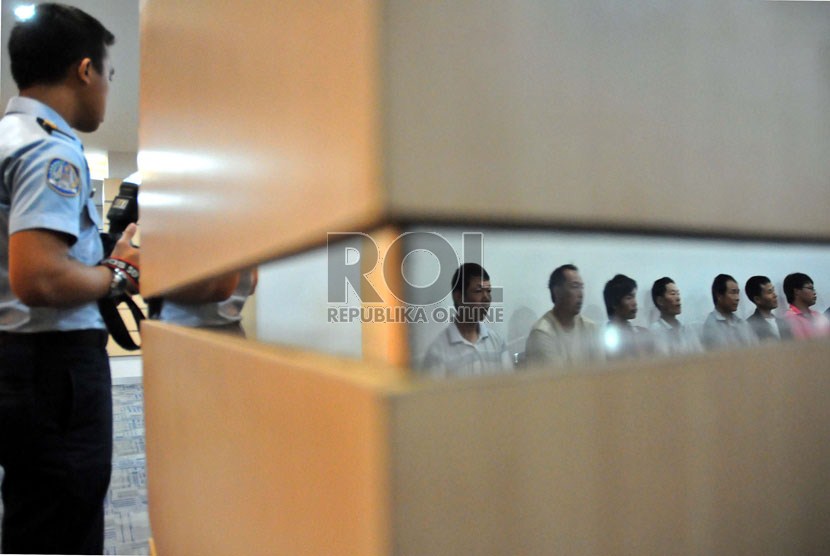By: S Riyanta *)
REPUBLIKA.CO.ID, The influx of foreign labors, especially those from China has become a serious subject of conversation. The flows of foreign labors have stepped up since the government of President Joko Widodo prioritized the infrastructure and energy projects. Those foreign labors are considered as a problem by some parties.
In Indonesia, the open unemployment rate has reached 7,02 million people or 5,5% (data from BPS in February 2016). The influx of foreign labors has become contradictive from a program to reduce the unemployment rate which still high enough. The threats related to the bigger number of foreigners presences that impact to the nation’s existences needs to be respond seriously. Fears of foreign influence on the ideology and culture of the nation is certainly reasonable to be addressed.
There are some cases related to foreign labors that happened lately, such as the arrests of 26 illegal labors from China in Sukabumi because of the using of tourist visas to work as labors in PT. Shanghai Electric Group. Other case that happened is the arrest of foreign labors while drilling in Halim Perdana Kusuma Airport lands in Jakarta. In West Borneo, foreigners from China who worked in CV. Sari Pasifik Wood Factory, Kubu Raya, have been arrested by immigration officers. They arrested in immigration violation cases raid because they didn’t have illegal work permit, Thursday (4/21).
The cases of violation of foreign labors also occur in Central Borneo. In April 2016, there were four foreigners from China who entered Central Borneo and worked in People Mining Area (Known as WPR) in Murungraya. They had been arrested and deported by Palangkaraya immigration officers. In North Maluku, foreign labors became the issues as well. The number of foreign labors that has been recorded by North Maluku Workers Department has reached 935 workers in September 2016.
The data that has been mentioned were just the small part of foreign labors existences in Indonesia. Right now, it has been the general information that many projects, such as PLTU which used foreign labors especially from China. Based on the regulation, foreign labors in Indonesia must have competence certificate or have at least 5 years work experience in accordance with the positions that will be occupied by foreign labors. Furthermore, foreign labors must fulfill immigration dan employment requirement in Indonesia.
Serious Threats
Judging from several illegal foreign labors cases in Indonesia would be reasonable if the existence of foreign labors is a serious threat. First threat is the reducing of opportunities for Indonesian to get a job on their own country.
There will be social jealousy problems if foreign labors took a project, while many of Indonesian will be unemployment. Social jealousy will get worst if the foreign labors who took those projects do not have special abilities, which can be done by Indonesian.
Other threats are refer to nation sovereignty. That is not just an assumption. China’s flag rising beside Indonesia’s flag during the first stone construction of the PT. WanatiaraPersada Smelter cases in North Maluku a few days ago were an early warning of the foreign labors presence that threatens the country’s sovereignty.
North Maluku government stated that those incidents happened because miscommunication, however it couldn’t be that simple. The presence of foreign labors from China in North Maluku in business matter is different from the diplomatic relation matter between two countries, so that China’s flag couldn’t stand and rise beside Indonesia’s flag.
Government Regulation
The employ of foreign labors has been stated clearly in Article 37 Paragraph (1) of the Regulation of the Minister of Labor No. 25 of 2015 about the amendments of the Regulation of Minister of Labor No. 16 of 2016 concerning the Employ Procedures for Foreign Labors (The Regulation of Minister of Labor No. 35 of 2015), in addition to other requirements as stipulated by the immigration.
In addition to the regulations that had been assigned, the government needs to review and consider the various things, such as culture and economic factors. Power plant construction or infrastructure projects in remote areas by using foreign labors will certainly affect the culture of the society around those areas.
Cultural crass will take place in midst of difficult and under pressure economic circumstances to the success of a project, then society will inevitably receive cultural impacts.
Government role is to maintain the good condition, so that the presence f foreign labors will not be the threats. In addition to the basic regulation, government needs to consider various things. Foreign labors presence restriction from the abilities sector, education sector and work limit sector in Indonesia needs to be regulated.
Projects that involved foreign labors should consider the technology and regeneration transfer. If the presence of foreign labors happened because of Indonesia’s labors inability, then the government should do technology transfer and regeneration with the maximum limit of time, so that Indonesia’s labors can independently performing their abilities some day and Indonesia can break the dependence from foreign parties.
The need to accelerate the development, especially in infrastructure and energy is a major challenge for the government of President JokoWidodo. Working closely with foreign parties (other countries) to fulfill these needs is a natural thing. In the other hand, the unemployment rate is still quite high and the vulnerabilities related to the ideology of this nation need a serious attention. The acceleration of infrastructure and energy needs can’t sacrifice the people rights to earn a decent living, let alone to sacrifice national ideology.
*) Postgraduate alumnus of Strategic Intelligence Studies, University of Indonesia, live in Jakarta.



